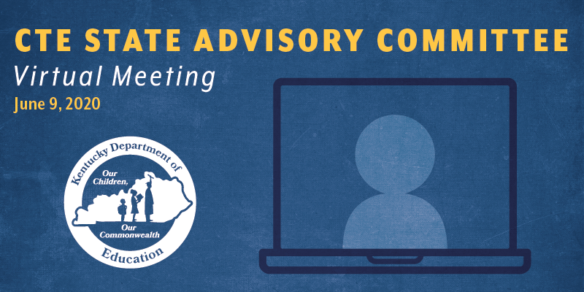
By Sky Carroll
sky.carroll@education.ky.gov
At its June 9 meeting, the Kentucky Department of Education’s (KDE) Career and Technical Education (CTE) Advisory Committee discussed the financial impact of the COVID-19 pandemic and the latest session of the Kentucky General Assembly.
The one-year budget passed by the General Assembly, established in House Bill 352, includes major provisions for CTE for the 2020-2021 year. Throughout the past year, KDE’s Office of Career and Technical Education and Student Transition (OCTEST) has sought to improve funding for all CTE centers, regardless of whether they are state or locally operated.
Leslie Slaughter, executive adviser in the OCTEST, gave an overview of how the budget will impact CTE.
There are currently 53 state-operated Area Technical Centers (ATCs) in Kentucky. There also are 42 local area vocational education centers (LAVECs), which are essentially locally run CTE centers that receive supplemental CTE state funding from a separate fund as defined in statute and administrative regulation. One provision in the budget deals with local districts petitioning for control of an ATC, which will give those districts the state funding for that center if they become locally operated.
“There has always been a process in place that has allowed a local district to petition to assume control of a state-operated center in their district,” Slaughter said. “These are new provisions for what that process might look like.”
Once a petition is granted to a school district for local control – rather than state control – of an ATC, that local board will receive 100% of the ATC’s state-allocated budget for the first year. For the second year, the local board will receive no less than 75% of the ATC’s state-allocated budget from the previous year.
Previously, statute said that a local board would receive 100% of the ATC’s funding in the first year, and then would receive LAVEC (local area vocational education center) funding.
“LAVEC funding is much smaller in nature,” Slaughter said. “This strikes the requirement that you have to go into the LAVEC formula and says that local districts will receive 100% in year one and 75% in year two.”
The 25% of ATC funding remaining in year two will be set aside to help fund current districts that have locally operated career and technical centers but do not receive supplemental state funding. There are currently eight districts that have locally operated centers but are not part of the LAVEC formula.
“This 25% will go into a side pot to help fund some of those unfunded local centers,” Slaughter said.
Kiley Whitaker, assistant director in KDE’s Division of Technical Schools and Continuous Improvement, said HB 352 will give an additional $200,000 in LAVEC funding. Whitaker went on to explain that, based on the provisions outlined in the bill, this funding will be allocated for the Taylor County locally operated center.
“There’s now around $12 million in LAVEC funding,” Whitaker said.
Right now, per regulation, KDE allocates a tentative amount of funding for LAVECs in the summer. The regulation then requires an adjustment mid-year to that allocation based on data for the current school year. However, because of the COVID-19 pandemic, that may change for this year.
“We do not feel that doing a mid-year adjustment and changing budgets is in the best interest of schools and districts,” Whitaker said.
For the next school year, Whitaker said the Division of Technical Schools and Continuous Improvement plans to ask the Kentucky Board of Education (KBE) to allow LAVECs to keep the tentative budgets from the summer so there is no mid-year change.
“They will know their budget for the whole year, as opposed to us giving them a tentative budget and then changing it halfway through the school year,” Whitaker said.
Along with the funding in the budget, ATCs will receive about $4.5 million in federal Elementary and Secondary Emergency Relief (ESSER) funds and each ATC will receive $2,500 as part of the Governor’s Emergency Education Relief (GEER) fund to assist with COVID-19 related needs and expenses.
Non-traditional Instruction (NTI) and CTE
KDE has created a Kentucky Tech emergency NTI plan for the 2020-2021 school year. The plan is still in the approval stages, and once it is approved it will be sent to ATCs.
Tom Thompson, division director for Technical Schools and Continuous Improvement in the OCTEST, gave some insights into NTI plans for CTE.
“Our NTI plans lean heavily on our districts,” Thompson said.
Thompson said the NTI plans for CTE are entirely supplemental to district plans, but solidifying NTI can be difficult since districts can have different plans. The OCTEST has encouraged ATC principals to reach out to their districts so they can finalize NTI plans.
Although there have been many challenges in providing CTE classes during the COVID-19 pandemic, several committee members praised KDE for how well things have worked since in-person classes were suspended March 16 by order of Gov. Andy Beshear. However, members discussed that if CTE must continue by non-traditional instruction, there are many issues for access and equity relating to technology that KDE should continue to address.
Harmony Little, director of career pathways in the Kentucky Community and Technical College System, raised concerns about all students being able to access NTI.
“In the event that CTE has to go back to NTI, it’s one thing to make it available online. It’s quite another for students to have access to it online,” Little said.
Little acknowledged that some things are out of their control, but believes committee members should continue to address the problem.
“It’s not just an access issue, it’s an equity issue,” Little said. “I think we should continue to raise that point to help make sure that everyone is on equal playing fields.”



Leave A Comment